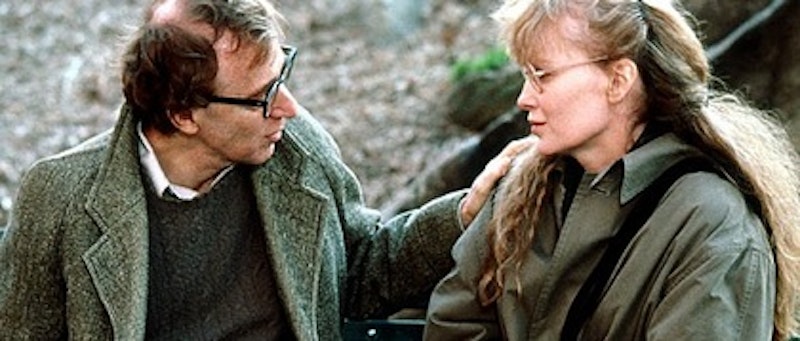Who hates Woody Allen?
I forgive you if you screamed, "I do! I do!" After all, he married his stepdaughter. He casts beautiful young women as his lovers in films, despite having never been attractive—not in 1970, not now. He's pessimistic. He hasn't bought a new pair of eyeglasses in at least 40 years. His portrayal of women is highly suspect. It took him decades to write his first decent black character, Chiwetel Ejiofor's in Melinda and Melinda (let's not count the hooker in Deconstructing Harry). He revels in stereotypes: of New Yorkers, Jews, intellectuals, older men. I think he even revels in people's disgust of him. I can't name one Woody fan among my group of twentysomething friends.
Finally, no one I know is as excited as I am to see Vicky Cristina Barcelona—coming out this week with the best reviews Allen has received in years and the fourth film in a world tour that started in London with Match Point.
I'm here to publicly declare my crazy love of Woody Allen’s’ films. No, I'm not 72 years old, or Jewish, nor a white man attracted to young Asian women. The exact opposite actually. I'm simply a film lover who appreciates a writer-director flexible enough to cross genres but self-assured enough to have a recognizable style. Allen has done thrillers, slapstick comedies, Chekhovian tragedies, and mixtures of all three. Most of all I love his consistently mature outlook on life. For years he has had the heart of old man: miserable, fickle and cynical. "To live is to suffer," the latest Newsweek has him saying.
Most people my age haven't even dipped into the vast ocean that is Woody Allen. They likely know the recent not-so-great Woodies—Scoop, Match Point, Melinda and Melinda. More will know Annie Hall and Manhattan, his two bona fide, canonized classics. If they are a little more sophisticated, they may know Hannah and Her Sisters, Deconstructing Harry, and a sprinkling of others.
All can be forgiven for wondering what the big deal is. To most, there isn't a big deal. Allen’s movies don't make much money: few gross more than $20 million, which is about how much The Dark Knight made in its first two and half hours.
Okay, so you've seen Annie Hall. But have you seen September and Interiors, two of Allen’s darkest dramas and tiny masterpieces in their own right? In September an emotionally weak Mia Farrow—was she ever anything else in his movies?—pursues a man unattracted to her while her mother torments her with horrors from her past. Located entirely in a summerhouse in Vermont, the film delves deep into the torment of living, even as the incomparable Elaine Stritch gives a hilarious performance as a vicious diva. Interiors explores similar themes of misery and loneliness but employs much more artful camerawork and lighting. Both films do what I like the most: carry the plot crisply and calmly to a logical and cathartic end. It's what Kafka, Chekhov and Strindberg did best.
Wait a minute, you say, Woody Allen is supposed to make us laugh! Yes, he is funny—kind of, sort of. I don't think he's the funniest director of the century. Maybe not even Top 10; many more are funnier. But Allen is at his best when his outlook on life—relentless, agnostic—is so extreme that all one can do is laugh. The best example is a scene in Deconstructing Harry with Kirstie Alley. Alley, playing Allen's ex and a therapist, is so enraged at him she cannot sit still in a session with a patient. She keeps getting up and yelling at him in the next room. We hear her screams from the patient's perspective, as he lies patiently in another room. Each time Alley returns to continue the session she is increasingly upset and inconsolable. It's absolutely hilarious. She's a therapist who can't keep it together. Fun!
Let's not forget the obvious. Allen is perhaps the single most dedicated documenter of New York in film history. He's captured many of the city's flavors: its romance and lyricism in Manhattan, its gentrified cleanliness in Anything Else and Melinda and Melinda, the industrial emptiness of Soho in Hannah and Her Sisters, and the charm of the boroughs in Radio Days. One reason I probably love Allen so much is I often long for New York. I grew up right outside the city but went to school in the Midwest and now reside in Philadelphia. Watching Woody is like coming home.
Now in Vicky he ventures to Barcelona, in what should be another shot into left field: a steamy, amber-hued romp with three of the hottest actors working today. Where has the old man's heart gone? Has he finally found joie de vivre? Unlikely, I think, and I'm eager to see how film's great cynic manages to squeeze realism from the lips of Penelope Cruz.
So for anyone who has yet to jump headfirst into Allen's whirlpool of delightful misfortune (40-plus films and growing at a rate of about one film per year): jump! For those who are old at heart, or who want to know what it feels like to be 72, there is no better way to enjoy the pleasures of misery and meaninglessness.
In Defense of the Nebbish
A string of mediocre features and some, ahem, questionable personal decisions have caused younger people to overlook Woody Allen. It's their loss.

From Crimes and Misdemeanors (1989).
